Scam emails have become a common occurrence in today’s digital age. From fake job offers to phony lottery winnings, scammers are constantly coming up with new tactics to trick unsuspecting individuals into providing personal and financial information. One such scam email that has been making the rounds recently is the “NortonLifeLock Billing payment” email. This email appears to be from NortonLifeLock, a well-known provider of antivirus software, but in reality, it is a cleverly disguised phishing attempt designed to steal personal and financial information from unsuspecting recipients. In this article, we will take a closer look at this scam email and provide tips on how to avoid falling victim to similar scams in the future.
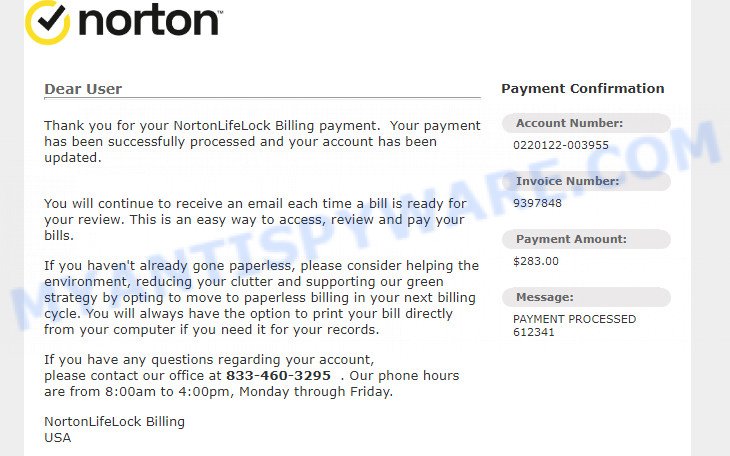
QUICK LINKS
- NortonLifeLock Billing Payment Scam Explained
- How the scam works
- How to spot and avoid such scams
- What to do when you receive a scam email?
- Report a Scam
NortonLifeLock Billing Payment Scam Email Explained
The NortonLifeLock Billing Payment Scam Email is a type of phishing email designed to trick recipients into providing personal and financial information. The email purports to be from NortonLifeLock, a well-known provider of antivirus software, and claims to confirm a billing payment. However, the email contains several red flags that suggest it is not legitimate.
One of the key warning signs is the email’s sender address, which is not associated with NortonLifeLock and appears to be randomly generated. Additionally, the email uses generic language and does not provide specific details about the supposed billing payment, such as the date or amount paid.
The email also includes a phone number that recipients are encouraged to call if they have questions about their account. However, this is a common tactic used by scammers to obtain personal and financial information from unsuspecting victims. When the recipient calls the number, they may be asked to provide sensitive information such as their name, address, or credit card number, which can then be used for fraudulent purposes.
A typical NortonLifeLock Billing Payment Scam Email reads as follows:
Payment Confirmation
Account Number: 0220122-003955Invoice Number; 9397848
Payment Amount: $283.00Dear User
Thank you for your NortonLifeLock Billing payment. Your payment
has been successfully processed and your account has been
updated.You will continue to receive an email each time a bill is ready for
your review. This is an easy way to access, review and pay your
bills.If you haven’t already gone paperless, please consider helping the
environment, reducing your clutter and supporting our green
strategy by opting to move to paperless billing in your next billing
cycle. You will always have the option to print your bill directly
from your computer if you need it for your records.If you have any questions regarding your account,
please contact our office at 833-460-3295 . Our phone hours
are from 8:00am to 4:00pm, Monday through Friday.NortonLifeLock Billing
Please Note: To ensure delivery of account related email
notifications. please add no-reply-invoicecloud.net to your safe
senders list.© 2010-2023, Invoice Cloud.
How the NortonLifeLock Billing Payment Scam works
Here is a step-by-step explanation of how the NortonLifeLock Billing Payment Scam works:
- The scammer sends an email that appears to be from NortonLifeLock, a well-known provider of antivirus software, to an unsuspecting victim. The email claims to confirm a billing payment and includes an account number and invoice number.
- The email includes a phone number that recipients are encouraged to call if they have questions about their account. This phone number is not associated with NortonLifeLock and is answered by the scammer or an accomplice.
- When the victim calls the phone number, they are prompted to provide personal and financial information such as their name, address, or credit card number.
- The scammer may use the information obtained from the victim to steal their identity, make fraudulent purchases, or gain access to their financial accounts.
- In some cases, the scammer may also encourage the victim to download malware or provide remote access to their computer under the guise of providing technical support.
- The victim may not realize they have been scammed until they receive unexpected bills, notice unauthorized charges on their credit card statement, or experience other negative consequences.
How to spot and avoid phishing scams like the NortonLifeLock Billing Payment Scam

Knowing how to spot and avoid scams like the NortonLifeLock Billing Payment Scam is an important skill that can help you protect yourself from identity theft, fraud, and other forms of cybercrime. Here are some tips for spotting and avoiding these types of scams:
- Check the sender’s email address. Scammers often use email addresses or phone numbers that look similar to those of legitimate companies, but with slight variations. Be sure to double-check the sender’s email address or phone number to ensure that it is legitimate.
- Look for poor grammar, spelling errors and typos, which are often indicators of a scam. Legitimate companies typically have professional and polished communications.
- Verify the information. Before taking any action, verify the information in the email by checking the company’s official website or calling their customer service line. Don’t use the phone number provided in the email, as it may be fake. Instead, use the official contact information found on the company’s website.
- Be cautious of unsolicited emails. If you did not expect to receive an email from Intuit, be cautious. Scammers often use unsolicited emails to trick people into providing personal or financial information.
- Be wary of attachments. Avoid downloading attachments unless you are sure they are safe. Instead, confirm the invoice details through official channels.
- Protect your personal information. Don’t give out personal or financial information in response to an email, even if it appears to be from a legitimate company. Legitimate companies will never ask you to provide sensitive information like passwords or credit card numbers over email.
- Trust your instincts. If something seems suspicious or too good to be true, trust your instincts and be cautious. Never give out personal or financial information unless you are sure the request is legitimate.
Examples of such scams
The NortonLifeLock Billing Payment Scam is just one of many types of scams out there. In addition to this type of scam, others include phishing emails and text messages that request personal information or ask for password resets, phone calls from scammers impersonating government agencies or legitimate businesses and threatening legal action, and tech support scams that offer to fix computer issues for a fee or by gaining remote access to a victim’s computer. Ads.financetrack(1).exe Pop-Up Scam, Financial Hardship Department Scam Email, and Amazon Account Locked Scam are some of the scams we reported recently.
- Avira Assistance PayPal Scam Invoice Email
- Financial Hardship Department Scam Email
- Intuit Norton Lifelock Scam Email
- Amazon Account On Hold Due to Billing Issue Scam Email
- Geek Squad Email Scam #2
Threat Summary
| Name | NortonLifeLock Billing Payment Scam Email |
| Type | Scam, Phishing, Social Engineering |
| Fake Claims | False invoice for subscription renewal |
| Sender | eBill@(Srv)Corporation nimixod_ufi62@icloud.com |
| Scammers’ Phone Numbers | 833-460-3295 |
| Damage | Financial loss, malware infection, identity theft |
| Distribution methods | |
| Prevention Tips | Verify messages and calls with the NortonLifeLock directly, never provide personal information to unknown callers |
What to do when you receive a scam message like the NortonLifeLock Billing Payment Scam Email
If you receive a scam message like the NortonLifeLock Billing Payment Scam Email, here’s what you should do:
- Do not open any attachments or click on any links in the email. The attachment could contain malware, which could harm your computer or steal your personal information.
- Do not call the phone number provided in the email. The phone number could be a ploy to get access to your computer or personal information.
- Check the sender’s email address carefully. If the email address does not exactly match the official NortonLifeLock domain, it’s likely a scam.
- Look for any misspellings or grammatical errors in the email. This is often a red flag for a potential scam.
- If you’re unsure whether the email is legitimate or not, contact Norton Lifelock directly using a phone number or email address that you know is legitimate.
- If you have already provided any personal information or clicked on any links in the email, take immediate steps to protect yourself. This may include changing your passwords, monitoring your credit reports, and contacting your bank or credit card company to alert them of potential fraud.
- Report the scam. If you believe you have received a scam email, you can report it to the Federal Trade Commission (FTC) at reportfraud.ftc.gov, to Norton Lifelock by forwarding the email to spam@nortonlifelock.com. Reporting scams can help protect others from falling victim to similar schemes.
- Stay up-to-date on the latest types of scams and how to protect yourself from them. Regularly review online resources from trusted sources to learn how to spot potential scams and protect your personal information.
Report a Scam
If you have received the NortonLifeLock Billing Payment Scam Email or a fake NortonLifeLock email that is similar but not the same as the example above, then post it as comment on this article. Please include the telephone number the text came from. This helps us to warn users about current scams, monitor trends and disrupt scams where possible.
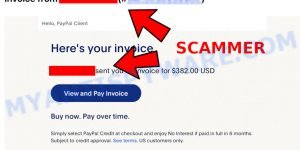
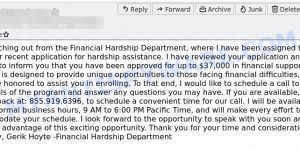
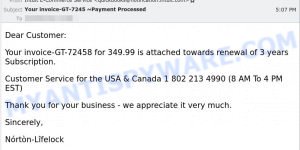
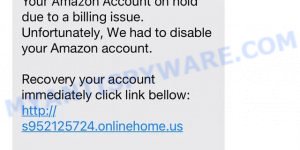
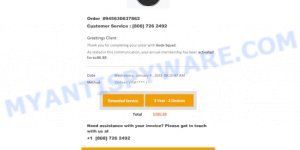


















The following email with attempting to use DocuSign. They also have a phone number to contact to unsubscribe to Norton.
As you can see from the e mail what they were attempting to do to divulge my CC number.
Respectfully,
Douglas English
—————————————————————————————————————————————————-
DocuSign
docusign[.]com
Allene J Samuel via Docusign
docusign[.]com
From:
dse_na4@docusign[.]net
To:
r8
Tue, Mar 4 at 1:29 PM
DocuSign
Allene J Samuel sent you a document to review and sign.
REVIEW DOCUMENT
Dear Member,
Your Norton Complete Protection subscription is scheduled to auto-renew on March 4, 2025 for $425.99. The payment will be charged to the credit card saved in your account.
Below is a summary of your renewal details: 📅
Renewal Overview
Renewal Date: March 4, 2025
Total Charge: $425.99
Payment Method: Credit card on file
Take Action to Avoid Charges
To cancel automatic renewal and prevent charges:
Contact Norton Support before March 4, 2025 at: 📞
+1 (562) 786-6993
(Hours: Mon-Sun, 8:00 AM – 8:00 PM ET)
After this date, your subscription will renew automatically. Charges may take up to 24 hours to appear on your statement.
🔒
Security & Support
Unauthorized activity? Call us immediately at +1 (562) 786-6993. Update payment method or adjust your plan? Our team is here to assist.
Thank you for choosing Norton LifeLock.
We’re committed to protecting your digital life and value your trust in us.
Sincerely,
The Norton LifeLock Billing Team
Do Not Share This Email
This email contains a secure link to Docusign. Please do not share this email, link, or access code with others.
Alternate Signing Method
Visit Docusign.com, click ‘Access Documents’, and enter the security code:
About Docusign
Sign documents electronically in just minutes. It’s safe, secure, and legally binding. Whether you’re in an office, at home, on-the-go — or even across the globe — Docusign provides a professional trusted solution for Digital Transaction Management™.
Questions about the Document?
If you need to modify the document or have questions about the details in the document, please reach out to the sender by emailing them directly.
Stop receiving this email
Report this email or read more about Declining to sign and Managing notifications.
If you have trouble signing, visit “How to Sign a Document” on our Docusign Support Center, or become part of the Docusign Community to access tips and guidance from peers.
Download the Docusign App
This message was sent to you by Allene J Samuel who is using the Docusign Electronic Signature Service. If you would rather not receive email from this sender you may contact the sender with your request.